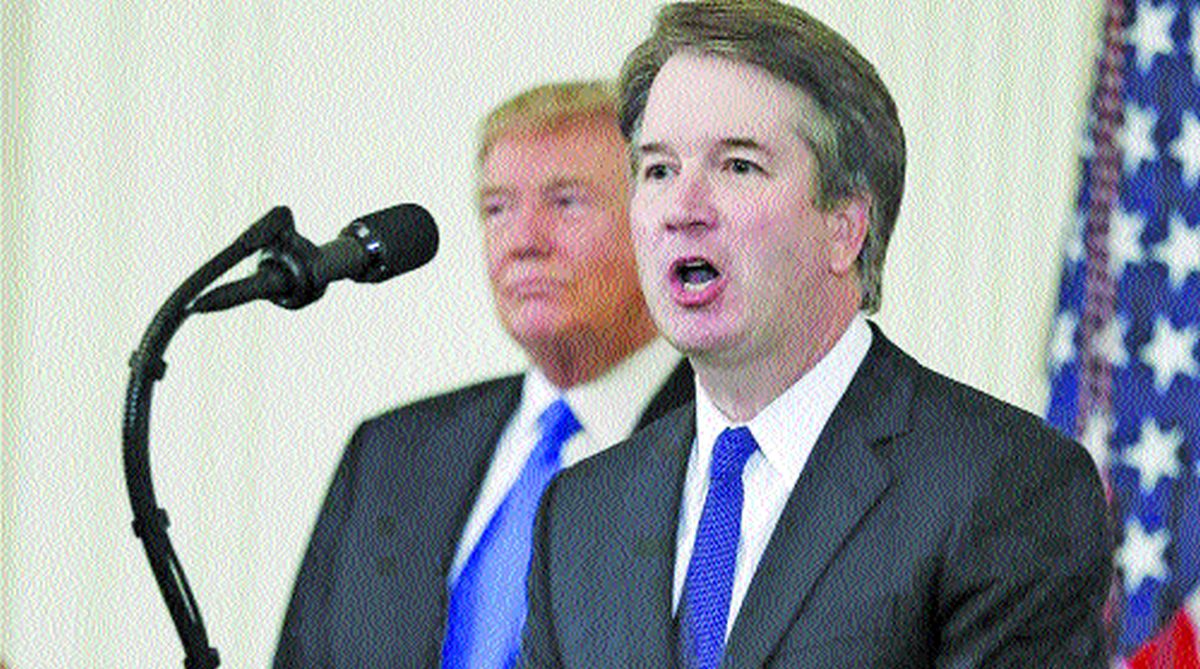Jaishankar to visit US for talks with key officials
"He will be meeting counterparts to discuss key bilateral, regional and global issues,'' the Ministry of External Affairs (MEA) said.

Brett Kavanaugh.
At a moment of unprecedented turmoil in Westminster, thanks go to Washington DC for a consoling comparison.
I wouldn’t overstate the scale of relief. In consolation goal terms, this one is on a par with Oscar’s for Brazil four years ago, seconds before the World Cup semi ended in that narrow 7-1 win for Germany.
Advertisement
But without adding much respectability to the scoreline, Donald Trump’s choice of the next Supreme Court judge gives a thoughtfully timed reminder about this. However perverted a political system must be to give birth to the devil-child Brexit fiasco, America’s is more perverted by miles.
Advertisement
On the eve of his trip to play hide-and-seek with lil-ol’ us, Trump revealed Brett Kavanaugh as his pick to replace the retiring Anthony Kennedy on a body which is more than America’s highest judicial bench.
It is the keeper of the constitutional flame, one of three equal branches of government, and the last and strongest line of defence against the abuse of presidential powers. The nine members who give judgments affecting hundreds of millions of lives are beholden to no one. They make their judgments without reference to political loyalties or affiliations.
That’s the plan anyway. The reality is that these are political appointees chosen not only for their jurisprudential wisdom – if that even is a concern.
Anyone with or without legal qualifications can be a justice. Donald Trump could nominate former KKK leader David Duke when the next vacancy arises.
If he did, once the two Republican “moderates” who enjoy making empty threats of defiance caved (as they almost certainly will with Kavanaugh), this dung beetle of a Senate would confirm either.
Supremes have generally been selected on the assumption that their legal opinions will be guided by political opinions not too dissimilar to those of their presidential sponsor. In recent decades, so long as they had a Senate majority waiting with the rubber stamp, Democrats in the Oval Office have invariably gone for liberals, and Republicans for hardline conservatives.
So you’d hardly expect a Senate-backed Trump, of all commanders-in-chief, to do what Barack Obama did in his final year in office by putting forward a centrist such as Merrick Garland – the nominee Republicans refused to confirm on the grounds that it was too close to the election to risk saddling an incoming president with a justice not to his or her taste.
It’s no huge shock that in Kavanaugh, Trump plumped for a muscular conservative; an “originalist” who interprets the Constitution in the way zealots stick to the letter of their holy book – as something set forever in stone, rather than a living document to be reviewed through the prism of any small societal or technological developments since it was signed.
Kavanaugh voted in support of the citizen’s right to own semi-automatic weapons, for instance, as “enshrined” in the Second Amendment right to bear arms.
Originalists aren’t concerned that the most lethal firearm in 1787 was the musket, or with the possibility that Jefferson and the lads might have had a rethink with the benefit of a Tardis trip to the scene of a high-school massacre.
Just about the only part of the Constitution the originalist will not defend, however much the late Antonin Scalia probably fantasised to a happy ending about it, is its original sin: the chillingly precise calculation of a black person’s worth as three fifths of a white’s.
Kavanaugh may not be a reactionary monster in the Scalia league. But a lower court judgment of his on universal abortion rights suggests that if and when Roe v Wade is relitigated, he will be the fifth vote to threaten American women’s right to terminate a pregnancy. He may be equally unsympathetic to LGBT+ and workers’ rights.
That’s standard stuff for a conservative justice these days. Where Kavanaugh stands out from the crowd is in the independence from party politics that should make him quite the Solomon if he ever has to judge whether – in the alleged Russian collusion or another context – this president is subject to the law.
If there are one of two faint hints of political partisanship on his CV, these are too trifling to be worth the bother of mentioning. For the record, he did work in the Republican interest on the litigation that led to the Supremes handing George W Bush the 2000 election. But that was an obscure and insignificant case with no serious ramifications.
Later, he was a White House lawyer for Bush to whom his wife, Ashley, was personal secretary. Of course, coincidences of the kind are as meaningless as his earlier contribution to drafting the report seized on by Republicans in Congress as cause to impeach Bill Clinton.
While he apparently believes a serving president should be subject to some kind of legal sanction, one suspects he may be less of an originalist about that if the question is asked about Trump. “I believe an independent judiciary is the crown jewel of our constitutional republic,” said Kavanaugh after his Oval Office introduction. If he’s half as good a justice as he is a self-parodist, the swing vote couldn’t be in safer hands.
The Independent.
Advertisement